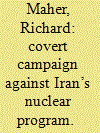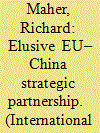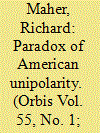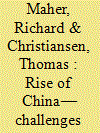|
|
|
Sort Order |
|
|
|
Items / Page
|
|
|
|
|
|
|
| Srl | Item |
| 1 |
ID:
162004


|
|
|
|
|
| Summary/Abstract |
RICHARD MAHER discusses the prospect of returning to a bipolar international system characterized by U.S.-China bipolarity. He argues that the consequences and implications will diverge in several respects from those that prevailed under the U.S.-Soviet bipolarity of the Cold War era.
|
|
|
|
|
|
|
|
|
|
|
|
|
|
|
|
| 2 |
ID:
183164


|
|
|
|
|
| Summary/Abstract |
This paper examines the covert campaign against Iran’s nuclear program and the implications it holds for both the theory and the practice of counterproliferation. The paper evaluates the degree to which covert action succeeded in producing meaningful delays and disruptions to Iran’s nuclear progress, in enhancing U.S. diplomatic leverage, and in helping to compel Iranian leaders to accept limits and restrictions on their country’s nuclear activities. More broadly, the paper analyzes the merits and viability of covert counterproliferation strategies, including how to define and measure the effectiveness of covert counterproliferation activity and how and under what conditions covert counterproliferation can be effective.
|
|
|
|
|
|
|
|
|
|
|
|
|
|
|
|
| 3 |
ID:
146506


|
|
|
|
|
| Contents |
In 2003 the European Union announced that it had launched a ‘comprehensive strategic partnership’ with China. This policy was intended to elevate EU–China relations beyond prosaic trade and investment issues to address some of the world's most pressing political and security challenges. Anything approaching a comprehensive strategic partnership over the past decade linking the EU and China has failed to materialize, however. This article clarifies and examines those issues that have impeded a closer EU–China alignment, and that hold the greatest potential for future discord in their bilateral relations. It explains how clashing political values, diverging geopolitical interests and priorities, and competing conceptions of world order has limited and will continue to limit the scope and depth of any EU–China strategic relationship. EU–China relations are today, and are likely to remain, contested, uneven and—apart from trade and investment—shallow, and embody a limited rather than a strategic partnership. As China's economic, military and political power continues to expand, the EU will need a new conceptual framework towards Beijing. This framework must be able to facilitate cooperation on issues and policies in which there is real potential for mutual gain, but also manage effectively the inevitable tensions and disagreements that arise.
|
|
|
|
|
|
|
|
|
|
|
|
|
|
|
|
| 4 |
ID:
152941


|
|
|
|
|
| Summary/Abstract |
How should Europe respond to China’s growing economic and military capabilities, and to the more assertive foreign policy behavior it has generated? Should it seek to check or even resist China’s rise, or should it instead rely on a strategy of engagement and accommodation? Three distinct and coherent strategic visions exist that could guide Europe’s policy and strategy toward China and the Asia Pacific over the next 10 or 15 years. These range from narrow commitments to Europe’s own security and material prosperity to more ambitious and expansive efforts to shape and influence events in the Asia Pacific. These three strategic visions are (1) balancing, (2) engagement, and (3) retrenchment. After outlining and evaluating each strategic vision, this article then offers a brief review and analysis of Europe’s current approach toward China, which is a hodgepodge of engagement and retrenchment. The article concludes by examining what might cause Europe to pursue a clearer and more consistent strategic approach toward China in the years ahead.
|
|
|
|
|
|
|
|
|
|
|
|
|
|
|
|
| 5 |
ID:
101207


|
|
|
|
|
| Publication |
2010.
|
| Summary/Abstract |
The decline in the United States' relative position is in part a consequence of the burdens and susceptibilities produced by unipolarity. Contrary to the conventional wisdom, the U.S. position both internationally and domestically may actually be strengthened once this period of unipolarity has passed.
|
|
|
|
|
|
|
|
|
|
|
|
|
|
|
|
| 6 |
ID:
148082


|
|
|
|
|
| Summary/Abstract |
The consequences and implications of China's rise have been analyzed and discussed from a number of perspectives. There has been little analysis that specifically evaluates the implications for the Atlantic Alliance, however, and whether an international system defined by U.S.-China bi-polarity would lead to a strengthening or a weakening of the transatlantic relationship. This article argues that China's rise will create security dynamics that likely will lead to a weakening of the Atlantic Alliance. It is unlikely that China's rise will provide NATO with a renewed purpose or give a convincing rationale for alliance cohesion the way the Soviet Union once did. Instead, China's rise will reveal divergent strategic interests and priorities among the members of the Atlantic Alliance, with a real possibility that America's rebalancing toward the Asia-Pacific could intensify perceptions on both sides of the Atlantic of NATO's declining geopolitical value and relevance.
|
|
|
|
|
|
|
|
|
|
|
|
|
|
|
|
| 7 |
ID:
152940


|
|
|
|
|
| Summary/Abstract |
China’s growing power and influence raise important and inescapable questions for countries and societies around the world, not least for Europe. A rising China offers opportunities for greater cooperation, both bilaterally and in the context of old and new multilateral institutions, yet also carries inherent risks for the European Union (EU), not least in the way in which it may make it (even) more difficult to manage the relations with other global powers while also maintaining unity among EU member states. This special issue examines Europe’s response to the steady and dramatic rise of China over the past two decades. In particular, it explores the challenges as well as the many instances of engagement that define their relations today across a number of policy areas, including economic, diplomatic, and security relations. The contributions to this special issue demonstrate the varied, multi-faceted and to some extent contradictory nature of EU-China relations. The two sides are in an ever-closer economic embrace, yet they remain distant and occasionally antagonistic with respect to security concerns or normative discourses.
|
|
|
|
|
|
|
|
|
|
|
|
|
|
|
|
|
|
|
|
|